In this article:
Depression is a mental illness. It is a mood disorder that causes a feeling of sadness that lasts for a long time. It also causes a lot of other symptoms that can affect a person’s day-to-day life.
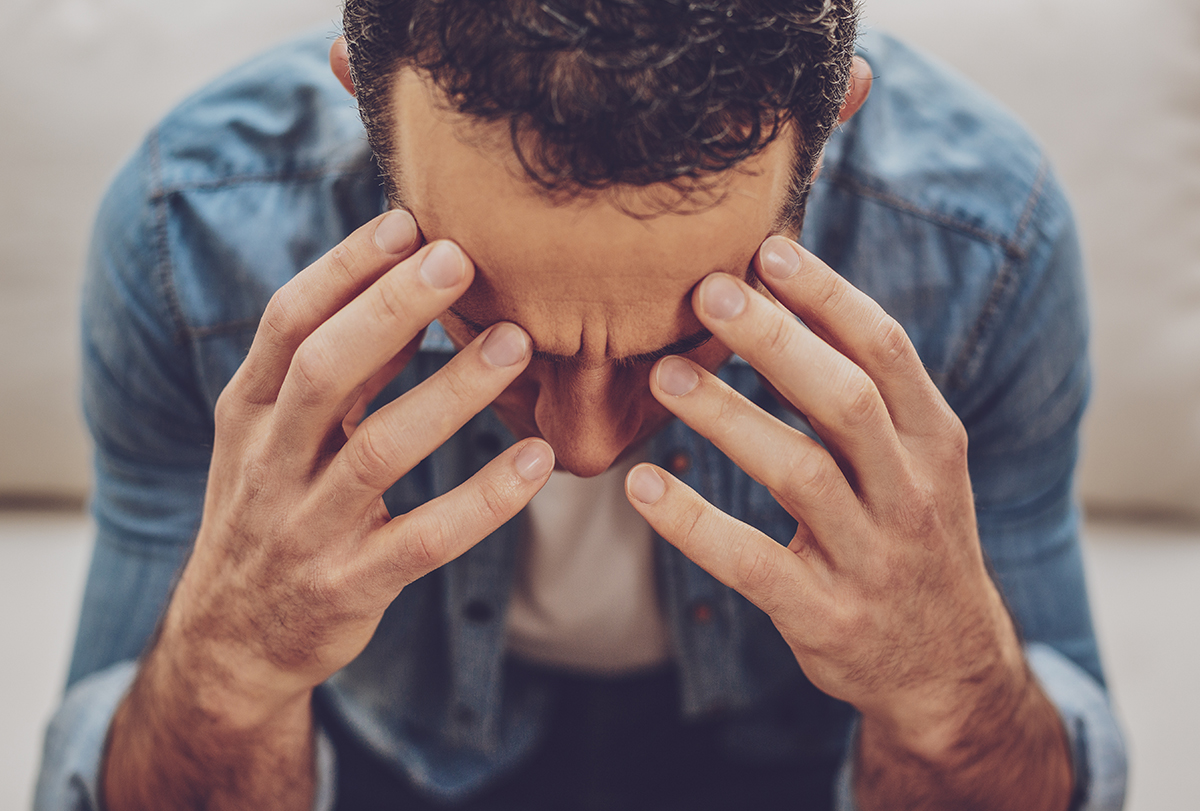
Depression is a serious medical issue that causes negative effects on the way a person feels, thinks, and acts. It can lead to a variety of emotional and physical symptoms. This condition can get pretty serious when a person starts thinking that life is simply not worth living. (1)
The World Health Organization (WHO) predicts that depression will be the leading cause of disability worldwide by 2030. Major depressive disorder (MDD), also known as clinical depression, unipolar depression, or simply depression, is the most prevalent psychiatric disorder in the world.
People with depressive illnesses are more likely to attempt suicide than those without, and major depressive disorder is the most common co-occurring disorder with other disorders such as substance use disorder (SUD).
Depression is a serious mental health disorder that requires professional help. People experiencing depression should seek medical help to properly manage their symptoms, as well as seek out appropriate support networks and lifestyle changes.
Treatment options for depression can include medications, psychotherapy, and lifestyle changes, such as regular exercise, stress management, and a healthy diet. Additionally, developing and maintaining meaningful social relationships are important factors in managing depression. (1)
Warning Signs of Depression You Shouldn’t Ignore
To some people, depression appears only as an occasional feeling of sadness or despair that is usually fixed by a good night’s sleep.
Experts explain how getting assistance for treating depression is not easy, be it men or women, but more tricky for men in some cultures as men are seen as all-powerful, also known as toxic masculinity.
Depression is greatly linked with physical impairment, physical illnesses, psychiatric comorbidity, and mortality in old age. Older males are additionally at risk when depression is correlated with loss of autonomy.
It is important to look out for signs of depression to get medical treatment on time and avoid further complications.
Here are some warning signs of depression to look out for:
1. Low self-esteem
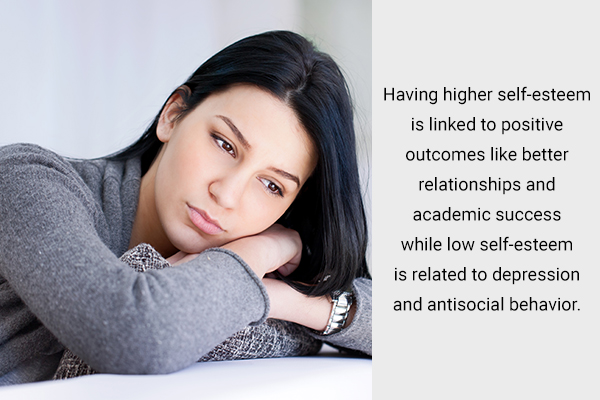
A study conducted in a Vietnamese school concluded that low self-esteem is associated with depression, which affects students’ quality of life and also may cause incidences of suicidal thoughts. Self-esteem is a very important part of life and it affects health and social outcomes.
High self-esteem is linked to positive outcomes such as better relationships and academic success, whereas low self-esteem is related to depression and antisocial behavior. Extensive research has shown that those who suffer from depression feel worthless and have a habit of self-doubt and self-blaming. (2)
2. Fatigue
Fatigue is a very common symptom of depression, and it affects a person’s physical, emotional, and daily functioning. Some medications given for depression have fatigue as a common side effect.
According to a leading psychiatry professor at Harvard medical school, fatigue is one of the most prominent symptoms of depression. It is associated with impaired concentration, irritability, and reduced productivity.
Even after some amount of treatment, fatigue remains to be one of the most common residual symptoms of depression. Research shows that fatigue is a repeatedly reported symptom of prominent depressive disorder, occurring in more than 90% of patients. (3)
3. Insomnia
Sleep disturbances in depression are very closely linked together. People who suffer from insomnia have a higher tendency of developing depression than those who are able to get a good night’s sleep.
Also, people who already suffer from depression have trouble falling asleep or at least staying asleep.
If you think you might be depressed and suffer from the following symptoms, you may need to consider talking to a doctor: (4)
- Unable to fall asleep
- Feeling tired the entire day
- Obstructive sleep
- Physical pain or discomfort
The prominent interest in the associations between sleep or circadian rhythms and depression is largely due to the research that has shown that insomnia or sleep disorder symptoms are independent predictors of depression. (5)
4. Excessive anger
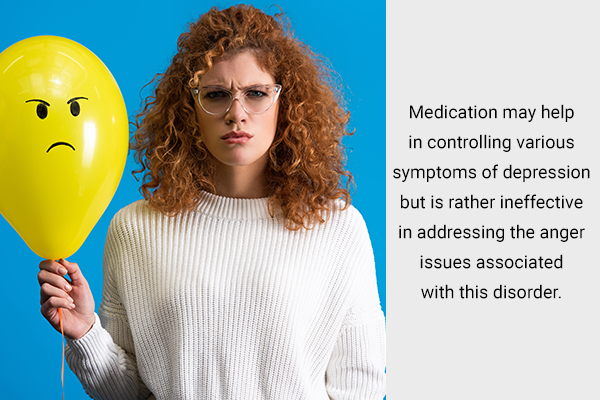
People who suffer from depression often have symptoms of suppressed anger. Medication may be successful in controlling depressive symptoms but is not able to address the anger problem that is associated with this mental list.
For this, cognitive-behavioral therapy is considered to be effective but it is not very frequently used. (6)
Studies show that there’s a subtype of depression that is characterized by the presence of irritability and anger attacks, which are often accompanied by:
- Tachycardia
- Sweating
- Flushing
- Tightness of the chest
In fact, roughly one-third of patients with depression have problems with anger attacks. (7)
5. Cognitive disabilities
Having the right concentration is very important for performing day-to-day functions. People who suffer from depression complain about difficulty concentrating, which negatively affects all their daily lives. (8)
In fact, people with depression often report experiencing problems pertaining to concentration and memory. Broad inefficiencies in cognitive functioning that are associated with depression include: (9)
- Concentration difficulties
- Distractibility
- Impairments in memory
- Negative self-focused thoughts
6. Dietary issues
Studies have found a link between eating disorders and depression. Eating disorders such as anorexia nervosa can be linked to major depression.
It has also been found that people who are depressed are unable to get proper nutrition as they tend to make poor food choices, which may further contribute to depression. Thus, depression can be characterized as a disorder with loss of appetite as a major symptom. (10)(11)
Research suggests that eating disorders are more likely to be connected with other mental illnesses, especially major depressive disorder. During the COVID pandemic, there was an increased prevalence of mental health disorders such as depression among patients suffering from eating disorders. (12)
7. Guilt and self-blaming
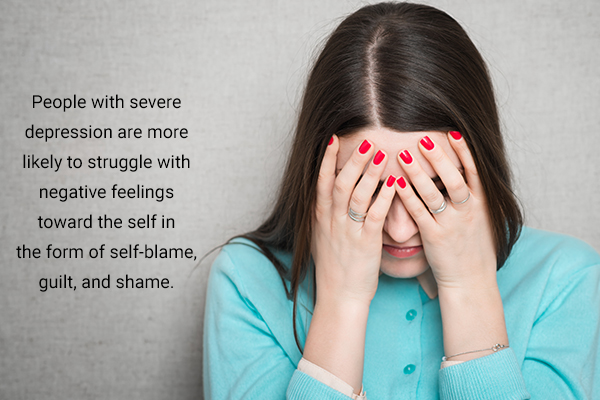
People with major depressive disorder are more inclined to undergo emotions related to self-blame, guilt, and shame. Studies show that these negative moral emotions affect people when they make social and financial decisions.
According to the American Psychiatric Association, disproportionate unreasonable guilt is one of the unique clinical symptoms of major depressive disorder, especially of the melancholic subtype. Even older studies suggest that patients with major depressive disorder have greatly raised levels of guilt.
One such example is the very common survivor’s guilt, which is associated with sensing oneself as living better off than others. (13)
What Are the Triggers for Depression?
Triggers for depression can include:
- Premenstrual syndrome
- Pregnancy
- Seasonal depression
- Loss of a loved one
- Trauma or abuse
Natural Ways to Cope With Depression
Self-management is a natural way of managing chronic conditions such as depression. It involves behavioral interventions for the day-to-day betterment of the illness.
Here are some natural ways to cope with depression. (14)
1. Diet
Poor diet is a risk factor for the onset of depression. Some important elements to be added to your diet include:
- Foods rich in antioxidants
- Food high in anti-inflammatories
- B vitamins
- Zinc
- Magnesium
- Vitamin C
- Plant compounds such as flavonoids
2. Physical activity and exercise
A sedentary lifestyle can be a risk factor for depressive symptoms. Studies suggest that increasing physical activity is associated with fewer depressive symptoms. This is because exercising is an effective mood elevator.
Exercise can be achieved through yoga and aerobic exercise.
3. Mindfulness meditation
Meditation improves mood and prevents depressive episodes. Studies show that meditation is a helpful intervention for depressive symptoms.
4. Managing recreational substances
Depression can coexist with alcohol abuse and dependence. There is also a study that shows that depressed mood is substantially relieved within a very brief period after refraining from alcohol.
Types of Depression
Depression is a common mental health condition and it can range from mild to severe. According to the International Classification of Diseases (ICD), for a diagnosis of depression to be made as mild, moderate, or severe, a person must experience major symptoms and minor symptoms for 2 weeks or more.
Major symptoms include depressed mood, loss of interest and enjoyment, and reduced energy leading to increased fatigue and a less active life. Minor symptoms include reduced concentration and attention, reduced self-esteem and self-confidence, ideas of guilt and unworthiness, a pessimistic view of the future, disturbed sleep, and disturbed appetite. (15)
Depression in teens
Depression can be difficult to recognize in teens, as their mood swings and irritability may be mistaken for typical behavior associated with adolescence. Unfortunately, young people are less likely to receive treatment for depression than other age groups, and research suggests that only around one in five of those who are suffering will get the help they need.
It is essential that parents, teachers, and other caregivers are informed about depression and understand its signs and symptoms so that teenagers can be identified and referred to the appropriate care and support.
It is particularly important that young people receive professional help to manage their symptoms and to build up positive coping strategies, as well as to develop meaningful social relationships.
Additionally, lifestyle changes such as regular exercise, stress management, and maintaining a healthy diet can help to reduce the symptoms of depression and improve overall well-being. (16)
Post-natal depression
It is important to be informed about depression and to recognize the signs so that those who are suffering can get the help they need. Postnatal depression is a type of depression that many parents experience after having a baby, while depression in pregnancy (antenatal depression) is also common.
If you or someone you know is showing signs of depression, it is important to get help as soon as possible. Professional help and support can be beneficial in managing the symptoms of depression and improving overall well-being. (17)
ALSO READ: Depression Types and Symptoms
What Are the Symptoms of Depression?
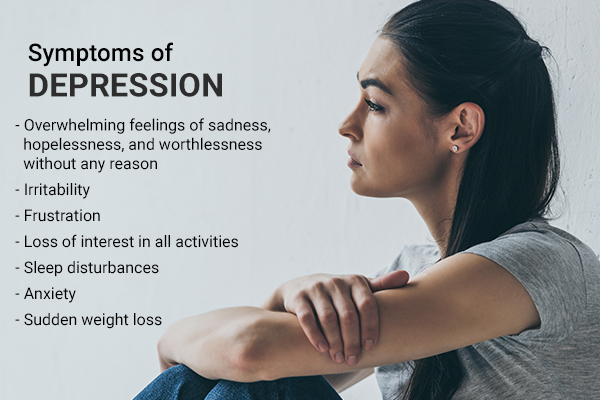
Symptoms of depression include: (18)
- Feeling of sadness
- Hopelessness
- Irritability
- Frustration
- Loss of interest in all activities
- Sleep disturbances
- Anxiety
- Sudden weight loss
- Worthlessness
- Self-blame
- Trouble concentrating
- Suicidal thoughts
- Back pain
- Headache
- Increase craving for food
- Frustration
How Is Depression Treated?
The good news is that depression is very treatable. More than 80% of people who suffer from depression respond well to the treatment; these patients are able to gain some sort of relief from their treatment for depression.
Before getting the proper treatment, the patient has to go through a thorough examination including an interview and sometimes even a blood test to rule out the possibility that depression is due to an underlying medical condition. (19)
Depression can be treated through the following:
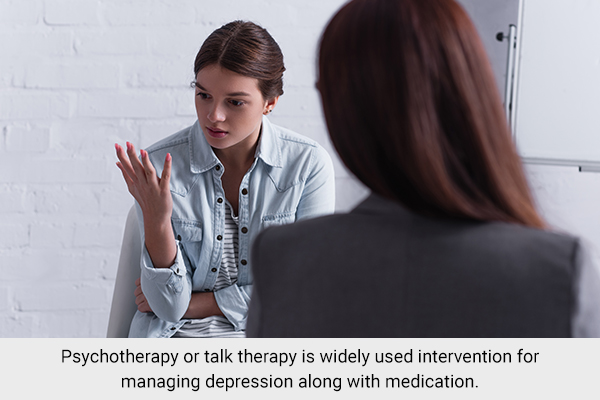
- The main treatment for depression includes medication such as antidepressants.
- Psychotherapy or talk therapy is also another way of treating depression that is done along with the medication.
- Cognitive-behavioral therapy is also effective in treating depression.
- Electroconvulsive therapy (ECT) can be an effective treatment option for those who suffer from major depression and are unable to respond to other therapies.
It is important to note, however, that ECT is not a treatment of choice and is not routinely used to treat depression. It will only be indicated if the condition is life-threatening and the patient needs to get better quickly; if the condition is causing immense suffering; if other treatments, such as medication and psychotherapy, have not been effective over a period of time; or if the patient has responded well to ECT in the past.
An ECT team usually consists of a nurse, an anesthesiologist, a psychiatrist, and a neurologist, and the stimulus used is either a brief pulse (0.5–2.0 milliseconds) or an ultra brief pulse (less than 0.5 milliseconds), rather than minutes as is often seen in films and television.
In addition, ECT is only carried out after the patient has given their informed consent and is usually preceded by a comprehensive psychological assessment. (20)
Additional treatment points
Here are some points shared by experts regarding the treatment of depression: (21)
- A lot of treatments are established based on the variety of depression, whether mild, moderate, or severe. The most important is self-care. Whenever you wake up, spend 5–30 minutes with yourself to nourish the senses with meditation and spirituality. It enables you to believe and feel the right in all situations. Do not start your day by checking the news, messaging apps, or social media.
- Taking care of your necessities such as proper exercise, steady sleep, proper timetable, a nourishing and balanced diet, and avoidance of alcohol are all good starting points for sound mental health.
- Psychoeducation is a form of therapy that focuses on educating people about their depression and providing them with tools to better understand and manage their disorder. Psychoeducation often involves formal education groups and one-on-one sessions with a mental health professional. These sessions help patients gain insight into their condition and learn about the various treatment options and resources available to them.
- In addition to psychoeducation, other therapies such as interpersonal therapy (IPT) and cognitive-behavioral therapy (CBT) may be employed to help address the underlying causes of depression. IPT focuses on examining depression in the context of the patient’s relationships, while CBT helps patients to identify and change the negative thought patterns that contribute to and maintain their depressed mood. Family therapy and group therapy are also beneficial ways to help people manage depression.
- Medication (pharmacotherapy) may be prescribed to elevate levels of neurotransmitters in the brain, which in turn can help to improve mood. This type of treatment is often combined with psychotherapy or other forms of counseling.
How Is Depression Different From Sadness or Grief?
Being sad or grieving over a loss is a natural process and a natural way to react to certain situations and may share some symptoms that are common to depression. Both grief and depression involve an immense feeling of sadness and disinterest in usual activities.
Some characteristics that differentiate the two are as follows: (18)
- In grief, you may have painful feelings mixed with positive memories, whereas in depression, disinterest lasts for more than 2 weeks.
- If you’re grieving or sad over a problem, you will not have low self-esteem, which is a big problem in those who are depressed.
- Grief is not usually associated with suicidal thoughts, which is something that people with depression might think of.
Serotonin Syndrome: A Complication of Depression Treatment
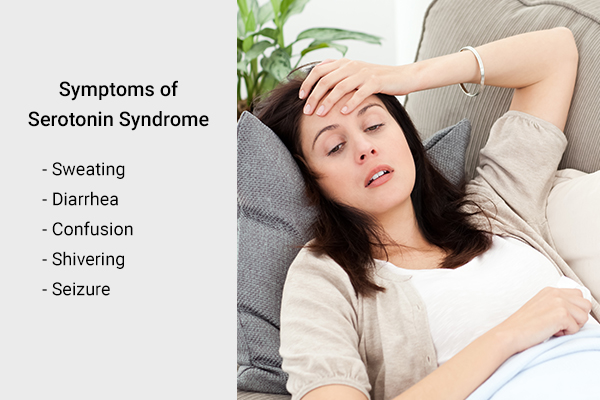
Most medications given to treat depression cause an increased amount of the chemical known as serotonin in the brain. If this chemical becomes too high, it can cause a health risk called serotonin syndrome. It is usually triggered when you take antidepressants such as SSRIs or SNRIs.
Symptoms of serotonin syndrome can include: (22)
- Sweating
- Diarrhea
- Confusion
- Shivering
- Seizure
The true incidence of serotonin syndrome is unknown, most probably because mild cases are often unnoticed or ignored. Even more severe issues may continually be attributed to other causes.
There is no affirmative test or distinct laboratory conclusions for this condition, and the syndrome has a wide range of severity from barely noticeable to lethal.
Serotonin syndrome happens in all age groups, and the incidence is rising with the expanded use of serotonergic agents. Serotonin syndrome may be an impact of therapeutic medication use, accidental interactions between medications or recreational drugs, or intentional overdose. (23)
When to See a Mental Health Counselor or Psychiatrist
Depression is a disorder just like diabetes or hypertension. Numerous people postpone a long time before pursuing help for depression, but it’s reasonable not to delay. The sooner you see a professional, the sooner you can be on the path to healing.
Most-Asked Questions About Depression
What conditions are related to depression?
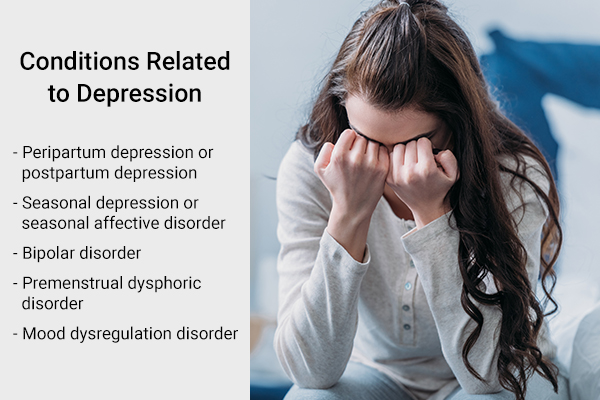
Some conditions related to depression include: (18)
- Peripartum depression or postpartum depression
- Seasonal depression or seasonal affective disorder
- Bipolar disorder
- Premenstrual dysphoric disorder
- Mood dysregulation disorder
How long does medicinal treatment for depression last?
Patients who suffer from depression are recommended to take their medication for at least 6 or more months depending on their condition or if symptoms have improved. Long-term treatment is important to make sure that future episodes of depression are prevented.
What medical problems can cause depression?
Medical illnesses that can cause an increased risk of depression include:
- Diabetes
- Obesity
- Cancer
- Heart issues
- Stroke
What are the side effects of antidepressants?
Long-term side effects of antidepressants can include: (22)
- Diarrhea or constipation
- Loss of appetite
- Agitation
- Loss of libido
- Dry mouth
- Weight gain
Like other medicines, antidepressants may cause adverse effects – there is not a single medicine that is useful, from paracetamol to vitamins, that does not result in side effects. However, not everyone will encounter these.
Some side effects of antidepressants can cause problems at first, but they typically get better with time. It’s crucial to go on with treatment, even if you’re impacted by side effects, as it will take many weeks before you start to achieve results from treatment. With time, you should see that the benefits of treatment overpower any problems from side effects.
In the first few months of treatment, you’ll usually see your physician or a specialist nurse at least once every 2–4 weeks to see how well the medicine is working.
What vitamin is a natural antidepressant?
A low level of vitamin D is linked to the pathology of mental disorders. A study revealed that more than 80% of outpatients with depression have vitamin D deficiency, and depressive symptoms significantly improve after vitamin D supplementation. (24)
Is depression more common in males?
Men have a greater ineptitude to adjust to age-related restrictions and loss of control. They are more likely to commit suicide.
Can untreated depression lead to suicidal thoughts?
Investigations in many places show that young people with a history of untreated mental issues also commit suicide. Many commit suicide after failed love affairs or after remaining silent victims of domestic violence.
Final Word
Depression is one of the most common and yet least understood disorders that are persistent in the world nowadays. Because depression is not a physical illness a lot of the time, it may be disregarded as something unimportant or something that simply does not exist.
It is important to recognize depression and mental illness and to get treatment if you or someone you know suffer from it. Creating proper awareness about mental illness, especially depression, is extremely important. One should not be ashamed of talking about their mental illness, because it is also one of the major medical issues which needs to be solved for better living.
Depression is becoming more and more common because of today’s lifestyle. From students to the elderly, everyone is prone to depression, and proper awareness and education about the same are needed.
- Was this article helpful?
- YES, THANKS!NOT REALLY


